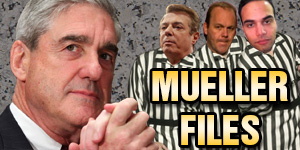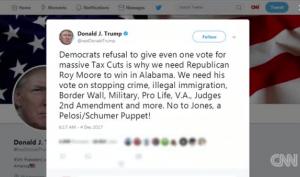Von Brunn As A 'Lone Wolf': Killers Act Alone, But These Are Not 'Isolated Incidents'
[Note: I was interviewed last night for CNN's Anderson Cooper 360 program to discuss lone wolves. My interview didn't air yesterday, but Cooper indicated they'd be reporting more on the "lone wolf" phenomenon tonight, so here's hoping my interview airs this evening. In the meantime, here's a warmup report, featuring the first of Cooper's pieces.]
When the Department of Homeland Security issued that law-enforcement bulletin on right-wing extremists two months ago, the mainstream right's chief shrieking point was that somehow the bulletin had conflated them with the extremist right-wingers.
Some typical headlines: "DHS Report Labels Conservatives as Radical Extremists". "The DHS Declares Everyone In America Is A Domestic Terrorist". "DHS To Target Conservatives." "New DHS Domestic Terrorism Report Targets Millions of Americans". And on and on. The upshot: Homeland Security was labeling conservatives America's chief terrorist threat.
But if you read the actual report, here's what it says is the chief domestic-terror threat America faces:
DHS/I&A assesses that lone wolves and small terrorist cells embracing violent rightwing extremist ideology are the most dangerous domestic terrorism threat in the United States. Information from law enforcement and nongovernmental organizations indicates lone wolves and small terrorist cells have shown intent—and, in some cases, the capability—to commit violent acts.
[..] DHS/I&A has concluded that white supremacist lone wolves pose the most significant domestic terrorist threat because of their low profile and autonomy—separate from any formalized group—which hampers warning efforts.
[..] Similarly, recent state and municipal law enforcement reporting has warned of the dangers of rightwing extremists embracing the tactics of “leaderless resistance” and of lone wolves carrying out acts of violence.
Now, here's the odd thing about "lone wolves": Right-wingers like to use the solitary nature of this kind of terrorist act to dismiss them as "isolated incidents." But in reality, the continuing existence of acts of this nature demonstrates primarily that the radical right in America is alive, well, and functioning better than it should. And the continuing -- and as we've seen this week, ultimately futile -- attempts by the right to whitewash their existence from the public consciousness have played no small part in helping that trend continue.
Watch the above video for an instructive comparison in how this is handled by a right-winger like Fox's Bill O'Reilly, and a more rational, rather centrist approach taken by Anderson Cooper and his guests on AC360 last night.
O'Reilly declares the matter over -- move along, move along -- because this was just a "lone nutcase." Meanwhile, Cooper and the SPLC's Mark Potok and anti-racist activist David Gletty have a thorough an rational discussion of what lone wolves are about.
As Potok explains, the "lone wolf" concept was popularized in the late 1980s by an Aryan Nations leader named Louis Beam as an extension of his strategy of "leaderless resistance." One white supremacist, a fellow named Alex Curtis, even went so far as to develop a "point system" for lone wolves.
A 2003 piece by Jessica Stern in Foreign Affairs described how even Al Qaeda was finding the concept useful. And she explains its origins:
The idea was popularized by Louis Beam, the self-described ambassador-at-large, staff propagandist, and "computer terrorist to the Chosen" for Aryan Nations, an American neo-Nazi group. Beam writes that hierarchical organization is extremely dangerous for insurgents, especially in "technologically advanced societies where electronic surveillance can often penetrate the structure, revealing its chain of command." In leaderless organizations, however, "individuals and groups operate independently of each other, and never report to a central headquarters or single leader for direction or instruction, as would those who belong to a typical pyramid organization." Leaders do not issue orders or pay operatives; instead, they inspire small cells or individuals to take action on their own initiative.
The strategy was also inspired by at least one "lone wolf" shooter: Joseph Paul Franklin, a racist sniper who in the late 1970s and early 1980s killed as many as 20 people -- mostly mixed-race couples -- on a serial-murder spree, and attempted to assassinate both Vernon Jordan and Larry Flynt. (Franklin was also the inspiration for William Pierce's Hunter, the follow-up novel to The Turner Diaries.)
There has been no dearth of lone wolves in the years since Beam set the strategy for the radical right: Eric Rudolph. Buford Furrow. Benjamin Smith. James Kopp. Jim David Adkisson. And now add Scott Roeder and James von Brunn to the list.
That's quite a trail of "isolated incidents," isn't it?
Brian Levin of the Center for the Study of Hate and Extremism at Cal State-San Bernardino was interviewed by Newsweek about lone wolves this week, and the resulting piece is a worthy explainer:
Was this an isolated incident?
It's isolated in the sense that this guy was a lone wolf, certainly in that he acted alone, but he's part of a movement of anti-Semites and Holocaust deniers. He lists major Holocaust-denier groups on his Web site and how there is going to be a major Holocaust-denial conference on July 25 in Orange County, Calif. He may have acted like a lone wolf, but he is part of a movement.
Are attacks like this simply desperate one-time acts?
Within the white-supremacist movement there is a strong notion of leaderless resistance. The notion is this: look, we can take over the country just by having small cells or lone wolves commit key acts of violence because the rest of the country, at least the whites, will then go along with you. It's called the "propaganda of the deed"—you know who the enemies are, you go out yourself and hopefully people will take notice and act together in resistance.
These ideas were promoted by Louis Beam, a KKK member, and published in The Seditionist, his newsletter, in the early '90s. It came out around 1991, but the idea has been pushed in the white-supremacist movement for a long time since. He has been a big influence on the white-supremacist movement. He's a very scary guy. He was noteworthy because he was also part of the militia movement in the '90s. He's not the inventor of leaderless resistance, but he's remembered for being the most important modern proponent of leaderless resistance in the neo-Nazi world.
So when Bill O'Reilly shrugs the Holocaust Museum shooting off onto the dustbin of that lengthening list of "isolated incidents," you have to ask yourself why. After all, a "lone wolf" just rid him of that meddlesome doctor, didn't he? Funny how conveniently that works out for O'Reilly.
(Please donate to C&L's 2009 fundraiser if you can. We need your support.)



















Comments